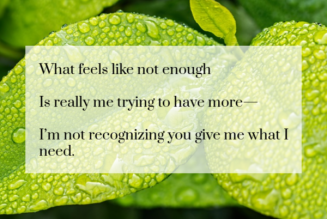Our moods are ones we tend to ignore. Or at least pay little attention to. We might nod to them briefly. Say a quick hello and back away, nervous about the power they have to claim the outcome of our day.
But to ignore them is to ignore the deeper places within us aching to speak.

I imagine there is an emotion you have felt this day that is uncomfortable–a little unpleasing to you–a feeling you wish were a bit different, a feeling you wish would listen to reason, chill out for a while, be calm and relaxed in a corner of the room: be good; don’t cause a stir. Or maybe you wish it speak up, be brave enough to stand up and have its say.
Whatever the emotion is that you’re feeling, don’t ignore it. Attend to it. Let it do what it needs to do. Feel it. Let it speak.
I invite you to pause for a moment, take a deep breath, and acknowledge what it is you actually feel. For from that place of feeling is a deeper place of truth. And your heart is desperate for this truth to come to the surface.
Will you help it?
Will you let it be discovered?
And then, with that feeling you feel, will you do one thing more? Will you write it down? Will you give the feeling shape? A name? A posture?
How does it look when it is sitting there, looking at you from across the room? Are its legs crossed? Is it jiggling its ankle with an impatient up and down bop of the foot? Is its brow furrowed? Its palms clenched? Or is it relaxed, tilting back a bit, even slouching as if in a cozy reading chair?
Don’t worry about trying to make sense of the feeling right now. Just address it. Name it. Be gentle with it–after all, you don’t want to frighten it away. You want it to stay awhile, get used to you, take off its coat and have something to eat. You want to have a conversation with this feeling; but first, begin with just sitting with it, getting comfortable with it (and having it get comfortable with you) just by endeavoring to share space in the same room.
After an awkward pause of silence or two, consider taking some notes. Try to get it talking and then write down what it says. Jot down everything you hear. Ask it where it came from, what it thinks about how this day is going, and what its plans are next.
Finally, as it starts to loosen up a bit, getting comfortable and trusting that you won’t hurt it further by your inquiries (it is imperative that it knows you are harmless–that each question you ask is for a good purpose that will benefit both of you in the long run) ask it for its permission to tell its story. And here is where you get to steer the car a bit: write down a few sentences that reveal the personality of this feeling–its hopes and dreams, its desires and fears. Get it all down. Don’t leave a thing out.
And then take a good hard look at what you’ve written.
What do you think about it?
And would you ever want to try to shape it into a poem? Share yours with the Loop Poetry Project this week. Write it as a comment below, on social media using the hashtag #looppoetryproject, or in the private Facebook group here.
love,
jennifer

The Fine Line Between Melodrama and Disorientation
Sorrow tells me I will not find myself,
recover the place within me that knew
the ease of things,
the trill of birds calling one to another,
exploding hope and promise,
while my knee aches
from overuse, I think,
and I hear the broken wall clock’s
minute-hand swing down to five-thirty
every six minutes while
my phone’s time reads phantom numbers
in the dark, and I wish I
were bike riding with you
in Amsterdam—or in Brugge when
we road outside the city to Damme and back,
through countryside of sweet green and windmills
and a bicyclist hit a woman walking,
or she had a stroke,
and people stopped to help her,
frail and disoriented, move off the path,
and we went as far as the path would let us,
one destination to another,
to accept going nowhere as a place
we no longer refuse to go.
This post appeared originally at jenniferjcamp.com









